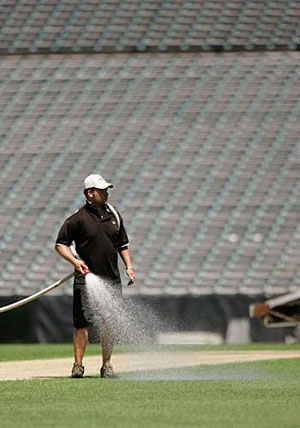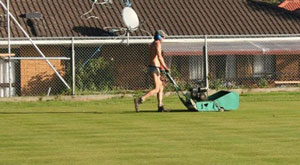Groundsperson
Tasks & duties

Groundspeople may do some or all of the following:
-
prepare and sow grass seed or lay turf
-
mow, water and roll grassed areas
-
renovate the turf
-
fertilise grounds and plants
-
repair fences and trim hedges
-
keep grounds tidy
-
cultivate flowers, shrubs and trees
-
spray turf to control pests and diseases
-
operate and maintain irrigation systems, mowing equipment and machinery
-
mark out sports fields and tennis courts
-
prepare and maintain golf courses, bowling greens or horse racetracks
-
prepare and maintain cricket pitches, softball diamonds or rugby fields
-
maintain buildings and changing rooms
-
manage staff and develop or manage budgets
-
keep records for planning and analysing methods
-
organise rubbish removal, recycling and composting
-
comply with Occupational Health and Safety (OSH) regulations
-
research turf care information
Specialisations
Racecourse assistant/manager
A racecourse assistant/manager does specialised training to prepare, maintain and supervise horse racing grounds and facilities. They may also carry out basic horse-handling tasks.
Skills & knowledge

Sports turf managers and groundspeople need to have:
-
understanding of soil and plant science (agronomy)
-
knowledge of soil types, soil fertility, fertilisers and agrichemicals
-
knowledge of pest, weed and disease control methods and how to put them into practice safely
-
knowledge of climate and weather forecasting
-
skill in plant and grass care
-
skill in machinery repair, including specialised turf equipment, mechanics and hydraulics
-
people and staff management skills
-
planning and record-keeping skills
-
problem-solving skills
Computer skills and knowledge of landscaping techniques may be useful. Skill in writing business plans, and yearly or project budgets are also useful for those in supervisory roles.
Entry requirements
You can train on the job and do an apprenticeship. Most employers prefer to see how people like the work before signing them up for apprenticeships.
The National Certificate in Sports Turf (Level 3) is suitable for those who want to be groundspeople. Most of the assessment is practical.
People wanting to move into sports turf management would start as sports turf trainees studying for a Level 4 National Certificate in Sports Turf Management, which is a mix of theory and practical skills.
NZ Sports Turf Industry Training Organisation website – information on apprenticeships and jobs
Racecourse management
To specialise in racecourse management, you need to complete a Level 3 qualification in Racecourse Maintenance through the Equine Industry Training Organisation (Equine ITO), followed by a sports turf
qualification.
Secondary education
At least three years of secondary education is recommended. Useful subjects include horticulture, maths, English and chemistry.
Tertiary Education
Sports turf managers can go on to do the Level 6 National Diploma in Sports Turf Mangement.
Sports Turf ITO website – information on advanced qualifications
A qualification in amenity horticulture is useful for people wanting to pursue a career with a wider horicultural or gardening focus.
Those wishing to specialise in racecourses should complete an equine qualification, before or at the same time as a sports turf qualification.
Training on the job
Certificates for spraying specified pesticides and other agrichemicals
-
You need A GROWSAFE certificate, or similar qualification, for spraying.
-
An Approved Handler certificate is necessary for handling some pesticides, and supervising other workers who are spraying.
-
If you are spraying for work on other people's property you may need to have a Registered Chemical Applicator certificate.
Useful experience
Useful experience for groundspeople includes gardening, soft landscaping or farming. Involvement in sports and any experience gained through work for parks and reserves departments is also useful.
Knowledge of the sport you are preparing turf for is useful but not essential.
Thousands of temporary workers are taken on by sports grounds in spring and autumn to renovate the turf. This is an excellent time to get a part-time job to try out the work and get known by a possible employer.
Related courses
Horticulture
Land, Parks and Wildlife Management
Landscape Architecture
For more information, please refer to Career Services.
Document Actions
